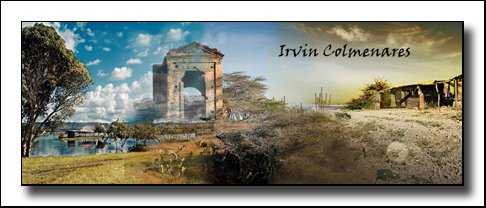Atender la casa mental | Attending to the mental house

Nos dice la neurociencia actual que cada uno de nosotros tiene su particular representación de la realidad, siendo nuestro cerebro el encargado de crear tales representaciones.
El proceso de construcción de nuestras imágenes mentales es altamente complejo, se combinan aspectos de todo tipo, desde estímulos sensoriales hasta normas y patrones culturales.
Ese proceso, completamente subjetivo, para nada es exacto. Incluso las representaciones mentales pueden llegar a ser totalmente ilusorias. Es el caso de los aparentes charcos de agua que vemos en las carreteras en las horas en que el calor es muy fuerte, o la imagen del lápiz partido que se produce cuando introducimos un lápiz en un vaso con agua y lo miramos de frente.
Siendo las cosas así es muy normal que cualquiera de nosotros pueda caer, sin darse cuenta, en sesgos cognitivos que no solo distorsionan nuestra imagen del mundo sino que también nos impiden tener una apreciación ecuánime de la realidad.

Tener todo esto presente es demasiado importante para cualquier emprendedor. Si estamos atentos a las interferencias que inciden en nuestra percepción tenemos más probabilidades de tomar mejores decisiones. Dedicar tiempo a poner en orden “nuestra casa mental” puede hacer una gran diferencia a la hora de seleccionar mejores alternativas y rumbos de acción.
Una de las cosas que debemos tener claro antes de embarcarnos en algún proyecto o emprendimiento, es que cada emprendimiento conlleva innumerables desafíos. A cada momento estaremos obligados a sacar conclusiones, evaluar alternativas, resolver problemas, dar repuestas…Y la calidad de todas ellas seguramente que será distinta en función de nuestra claridad mental.
Si estamos convencidos, por ejemplo, que los causantes de nuestros problemas somos nosotros mismos, porque creemos que tenemos alguna especie de incompetencia invencible, corremos el riesgo de no valorar adecuadamente las condiciones del entorno. O puede ser el caso contrario, estar convencidos que nada más con nuestra voluntad, capacidad o buena intención seremos capaces de voltear las condiciones adversas.
En las dos situaciones mencionadas probablemente no estemos siendo suficiente reflexivos, y entonces el mando de nuestras decisiones lo estaremos dejando a los sesgos cognitivos. En tal caso el riesgo de equivocarnos es demasiado grande.

Con frecuencia converso con pequeños y medianos emprendedores, es una manera de aprender de ellos y darme cuenta de cómo van resolviendo sus problemas.
En muchas de esas conversaciones me doy cuenta que poco toman en consideración esos asuntos que he mencionado arriba. A veces les pregunto, por ejemplo, por qué han tomado esta o aquella decisión y la respuesta me desconcierta, en la mayoría de los casos proviene de un “sentido común” o de lo que han visto hacer a los otros. No es de extrañar entonces que se repitan una y otra vez los mismos errores.
Es completamente comprensible que no tengamos conciencia del peso que nuestras creencias y sesgos cognitivos tienen en nuestras decisiones. Cada uno está convencido que su manera de pensar es la más racional, es la correcta, por eso es muy difícil darnos cuenta de forma “natural” de las distorsiones que operan en nuestro pensamiento.
Nuestros problemas de percepción y sesgos cognitivos no son fáciles de detectar, no relucen como si fuesen estrellas. Para llegar a ellos es necesario estudiarlos, investigar, y muchas veces ponernos en manos de personas conocedores que nos ayuden a iluminar el pensamiento.
Todo esfuerzo que hagamos para conocernos más tendrá un impacto positivo en la manera en que pensamos y en la calidad de las decisiones que tomamos en nuestros emprendimientos.
Gracias por tu tiempo.
.jpg)

Current neuroscience tells us that each of us has our own particular representation of reality, with our brain being in charge of creating such representations.
The process of constructing our mental images is highly complex, combining aspects of all kinds, from sensory stimuli to cultural norms and patterns.
This completely subjective process is by no means exact. Even mental representations can become totally illusory. This is the case of the apparent puddles of water that we see on the roads in the hours when the heat is very strong, or the image of the broken pencil that is produced when we introduce a pencil in a glass of water and look at it head on.
Things being so, it is quite normal that any of us can fall, without realizing it, into cognitive biases that not only distort our image of the world but also prevent us from having an even-handed appreciation of reality.
Keeping all this in mind is all too important for any entrepreneur. If we are attentive to the interferences that affect our perception, we are more likely to make better decisions. Spending time to put in order "our mental house" can make a big difference when it comes to selecting better alternatives and courses of action.

One of the things we must be clear about before embarking on any project or venture is that every venture involves innumerable challenges. At every moment we will be forced to draw conclusions, evaluate alternatives, solve problems, give answers... And the quality of all of them will surely be different depending on our mental clarity.
If we are convinced, for example, that we ourselves are the cause of our problems, because we believe that we have some kind of invincible incompetence, we run the risk of not adequately assessing the conditions of the environment. Or it may be the opposite case, being convinced that only with our will, ability or good intention we will be able to turn adverse conditions around.
In both situations mentioned above, we are probably not being reflective enough, and then we will be leaving the control of our decisions to cognitive biases. In such a case the risk of being wrong is too great.
I often talk to small and medium-sized entrepreneurs, it is a way to learn from them and realize how they are solving their problems.

In many of these conversations I realize that they do not take into consideration the issues I mentioned above. Sometimes I ask them, for example, why they have taken this or that decision and the answer puzzles me, in most cases it comes from "common sense" or from what they have seen others do. No wonder then that the same mistakes are repeated over and over again.
It is completely understandable that we are unaware of the weight that our beliefs and cognitive biases have on our decisions. Everyone is convinced that his or her way of thinking is the most rational, is the correct one, so it is very difficult to realize in a "natural" way the distortions that operate in our thinking.
Our perception problems and cognitive biases are not easy to detect, they do not shine as if they were stars. To get to them it is necessary to study them, to investigate, and many times to put ourselves in the hands of knowledgeable people who help us to illuminate our thinking.
Every effort we make to know ourselves better will have a positive impact on the way we think and the quality of the decisions we make in our endeavors.
Thank you for your time.
Translated with DeepL.com (free version).








Comunidad Be Entrepreneur

Posted Using InLeo Alpha
Aquí, lo principal es que el «emprendedor» no debe estar aislado, será la cabeza, pero necesita un cuerpo integrado por un número par de miembros para que totalicen siempre uno impar; de tal manera que, es número impar de partes tomen en conjunto las decisiones que en consideración sean más acertadas. El emprendedor «solo», como único ser pensante y ejecutante, no tendrá la capacidad de atinar a decisiones coherentes y acertadas.
Sí, al tomar las decisiones en forma solitaria se aumenta el margen de error. Gracias por pasar y comentar estimado @amigoponc. Un fuerte abrazo desde maracay.
¡Qué buen material! Esto me parece muy importante porque el pensamiento, cambiarlo o fortalecerlo, hacerlo un pensamiento de poder como digo yo, es la base para emprender; por eso cuesta arrancar...
Muy buen post @irvinc
Me alegra que te haya gustado. Fortalecer el pensamiento es muy importante para desarrollar los emprendimientos. Gracias por pasar y comentar estimado @emiliorios. Un fuerte abrazo desde Maracay.
Yes our mental house is where our success begins as well as failure so when we build it with the spirit of resilience we will definitely be a successful entrepreneur.
We can build our mental house by reading some experiences of successful entrepreneurs , the challenges they face and how the survived.
Nice writeuo
Knowing the experiences of others is a great source of learning. Thank you for stopping by and commenting, dear @beauty197 . A big hug from Maracay.
👏 Keep Up the good work on Hive ♦️ 👏
❤️ @soyunasantacruz suggested sagarkothari88 to upvote your post ❤️
Thank you so much.
Muy interesante tu post @irvinc, me encantó como llevaste la reflexión sobre el cuidado mental al tema concreto del emprendimiento. Gracias por darnos esta mirada. !LOTUS
@tipu curate 8
Upvoted 👌 (Mana: 0/75) Liquid rewards.
Me alegra que te haya gustado. Muchas gracias por el apoyo querida @miriannalis. Un fuerte abrazo desde Maracay.
¡@irvinc! Has recibido un aporte en $LOTUS de parte de @miriannalis.
Gracias por ser un promotor de bienestar dentro de nuestra Blockchain. Te animamos a continuar publicando contenido de calidad y de inspiración para el crecimiento y bienestar.
Más información sobre el token de $LOTUS en Lotus Token Relaunch
Muchas gracias.